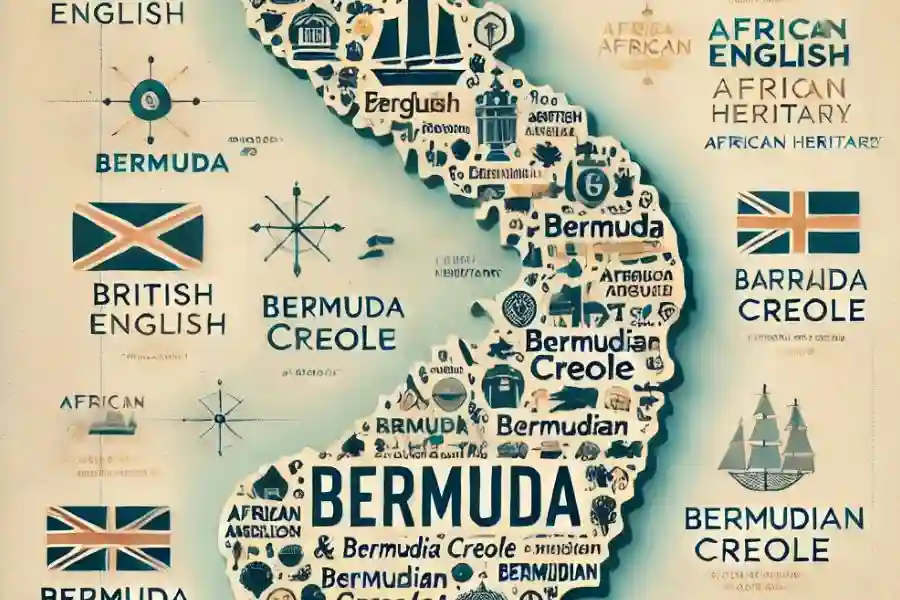Bermuda is a small island in the North Atlantic Ocean south of the US and east of the Caribbean that has a unique backstory of indigenous, African, British, and American influences. The languages used by the Bermudians are another testament to this diverse culture. English is the official language nowadays, but parts of other languages, even Creole, remain and are spoken by some people, in some formats.
By the end of the article, we want to respond to the questions: do Bermudians speak Creole, what is the source of Bermuda Creole, and how is language part of daily life for a Bermudian? Vision of Bermuda Gazette — The purpose is to deliver an in-depth look at the linguistic landscape of Bermuda, provide context for the typical misconceptions, study the history of Creole in Bermuda, and how that gift is still felt to this day.
Key Takeaways
- Bermuda’s primary language is English, but Creole plays a significant role in the island’s cultural identity.
- Bermuda Creole, or Bermudian dialect, has roots in the African slave trade and has evolved.
- While Creole is not an official language, it remains important for expressing Bermudian identity and heritage.
Understanding Bermuda’s Linguistic Landscape
The official language of Bermuda is English, which is also utilized for education, government, and industry. But, as with many island nations, Bermuda has its flavor of English, called the Bermudian dialect. This dialect incorporates characteristics of British English, African languages, and other language results. Bermudian English and Bermuda Creole are similar but not exact.
Bermuda’s language echoes the island’s past, including British colonization, the transatlantic slave trade, and, more just, migration from other countries. The development of the people of the land via the centuries was characterized by a variety of influences that blended themselves into a special language blend thoughtful of the diversity of its individuals.
The Origins of Bermuda Creole
Bermuda Creole (or Bermudian Creole, or Bermuda dialect) developed in the seventeenth century when enslaved Africans were brought to Bermuda and employed on ranches. Creole, a lingua franca, was the common language enslaved people knew to speak between groups who spoke disparate African languages, as well as the wording of the English-speaking settlers.
Creole languages are simplified languages that originate from the fusion of two or more tongues, usually in the context of trade or colonization, as speakers of different languages sound, often in a simplified form. In Bermuda’s case, African languages mixed with English evolved into a unique creole, which was said at first mostly by the African-descended people. In time, this language word became an essential part of the Bermudian identity.
Is Bermuda Creole Still Spoken Today?
Yes, some people in Bermuda still say Bermuda Creole, though it has been failing over recent decades. Younger Bermudians are more likely to speak Standard English in day-to-day life, with Creole being mostly spoken in informal conditions and among older years.
So, Creole is often used in music, storytelling, and other conditions of cultural presentation, helping preserve the speech as part of Bermuda’s cultural legacy. Though it is no extended spoken as widely as it once was, Bermuda Creole is a key part of the linguistic history of the island.
The Role of Creole in Bermudian Culture
Creole is important to Bermudian culture, even if it is not spoken as much as it used to be. The language is a symbol of the island’s African heritage and is often relied upon to convey cultural identity and solidarity.” Creole is an important element of musical styles founding Bermuda, such as Gospel and Reggae, whose lyrics frequently use Creole phrases and terms as Bermudians are proud to identify themselves with their roots.
Besides music, Creole is found in oral storytelling and traditional performances, woven into Bermudian folklore and rituals. In this regard, the language is maintained as a remnant of the island’s diverse past.
The Influence of Creole on Bermudian Music
Perhaps the most lasting legacy of Creole in Bermuda is the impact that it left on local music. Like any culture, Bermudians have a strong connection to music as a form of cultural expression, and Creole is an important aspect of this musical expression. Creole phrases are common in Gospel music, Reggae, and elsewhere, art forms that draw on the island’s African roots and heritage.
Creole has also been used by some artists such as Terry L. T. and The Bermuda Gombey Dancers to perform in Creole language as it is often perceived as a way to connect closely with the public and their traditions. These new musical forms have helped to keep Creole alive, at least as a sung language, although its use in the spoken word has declined.
Bermuda’s Education System and Language Use
The linguistic future of the island lies within the education system and the schools of Bermuda. Although English is generally the language of instruction in schools, awareness grew of the need for cultural identity—and Bermuda Creole was the source of that identity. In recent years, educators have also sought to incorporate Bermuda Creole into cultural studies programs so younger generations can know the island has its language. In fact, certain language scholars argue that Creole should be taught in schools as a means to promote language and cultural continuity.
Bermuda Creole vs. Standard English
A widespread misconception is that Bermuda Creole is just a “broken” or “improper” form of English. But Bermuda Creole is a complete, separate language with its own grammatical rules, words, and syntax. It is not merely a bad version of English but a language with its internal logic, shaped by the island’s history.
Most people would use Bermudian English (sometimes called Standard English) for school, formal writing, and in the workplace. Creole is usually used in less formal, familiar, and localized contexts, but both languages hold value to the island and they aim to continue to preserve them as a way of presenting and holding the rich tapestry of culture alive in Bermuda.
The Future of Bermuda Creole
Bermuda Creole has a doubtful future. Although it is still used in some circles, its place in general conversation is diminishing. With a globalizing world shaping Bermuda’s youth, the Standard English mode of communication is increasingly becoming the norm — and Creole is likely to eventually die out of everyday use.
But preservation efforts in the form of music, oral traditions, and education provide hope that Bermuda Creole will remain part of island life. The Bermuda Gazette urges more of the island’s youth to not only learn about the culture that shapes who they are but to also embrace the language they have spoken for generations.
Frequently Asked Questions
Is Bermuda Creole the same as Jamaican Patois?
No, while both are Creole languages influenced by African languages, they have distinct grammatical structures, vocabulary, and influences. Bermuda Creole is influenced by British English and African languages, while Jamaican Patois has influences from both English and other Caribbean languages.
Why is Bermuda Creole important?
Bermuda Creole is important because it reflects the island’s cultural history and heritage, particularly the African influence brought by enslaved people in the 17th century.
Is Creole taught in schools in Bermuda?
While Creole is not part of the formal curriculum in most schools, some educators and cultural organizations are working to include the language in cultural studies to help preserve it for future generations.
Is Bermuda Creole still widely spoken?
It is still spoken by some older residents and in informal settings, but its use has declined among younger Bermudians who tend to speak Standard English.
Conclusion
The summary, Bermuda people did speak Creole (but it is the Bermuda standard English that is used). It is a critical component of Bermuda’s cultural uniqueness and is still being held through music, storytelling, and cultural traditions. Bermuda Creole recalls the island’s various history and is controlled by British, African, and indigenous languages.
How do you see Creole remaining an important aspect of Bermudian culture moving forward? Do you want to know more about Bermuda’s culture, history, or language? To learn more about the Vision of Bermuda Gazette please visit our other blogs.

